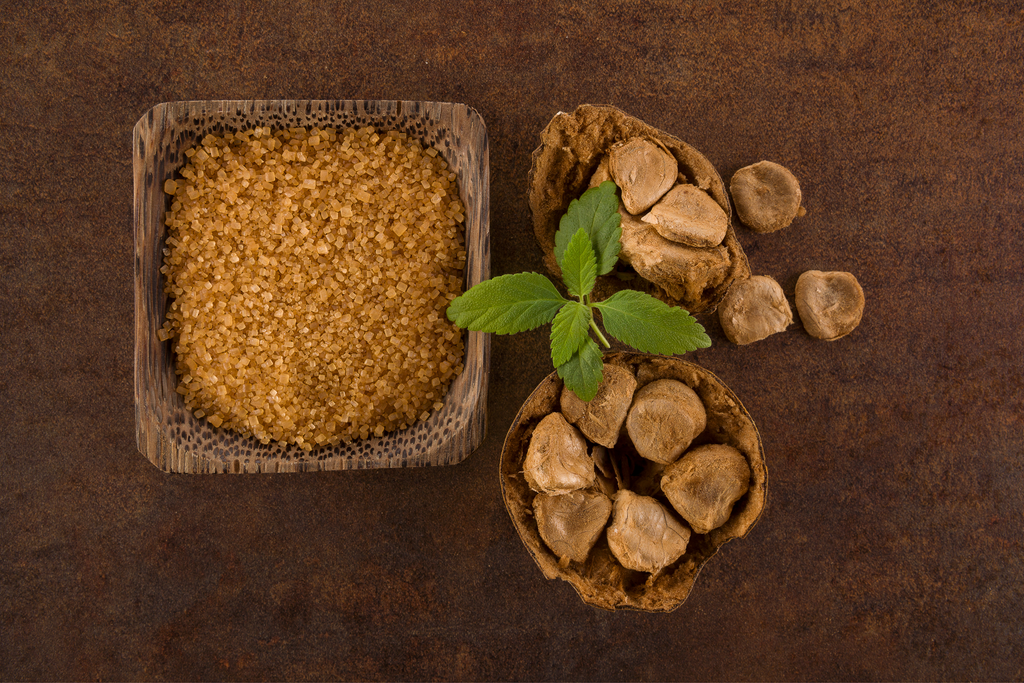Your Cart is Empty
The Ultimate Guide to Blueberries: Health Benefits and Fun Facts
Blueberries are more than just a delicious superfood. Packed with essential nutrients, ...
READ MORE
Is pure monk fruit sweetener healthy? Often referred to as "Nature's sweet secret," monk fruit (also known as Luo Han Guo) is a small gourd-like fruit packed with a plethora of health benefits. This ancient fruit is renowned for its intense natural sweetness and rich antioxidant content, acting as a perfect alternative to artificial sweeteners.
Monk fruit is a small, round fruit native to southern China, traditionally used in both herbal medicine and as a natural sweetener. Its use dates back to the 13th century, during the time of the Luo Han Buddhist monks - hence the name 'monk fruit'. Unlike sugar, monk fruit gets its sweetness from unique compounds called mogrosides which contain antioxidants that provide numerous health benefits - truly making it the "world's first superfood sweetener."
Its profound health-giving properties have led to an increase in monk fruit's popularity in recent years. Despite its relatively recent entry into the Western food industry, monk fruit has been subjected to rigorous scientific investigation, reinforcing its credentials as the world’s healthiest natural sweetener.
Monk fruit stands out from the rest of the crowded sugar alternatives market due to its numerous health benefits. Below, we delve into some exceptional monk fruit sweetener benefits. Incorporating monk fruit into your everyday routine, either through the use of a monk fruit sweetener or directly in your meals, can help to support your wellbeing in numerous ways.
Monk fruit is a calorie-free, carb-free sweetener that doesn't raise blood glucose levels, making it a suitable sweetener for those managing diabetes or anyone trying to reduce their sugar intake.
Besides its sweetening properties, monk fruit is a rich source of antioxidants, particularly mogrosides, which are responsible for the fruit's intense sweetness. These mogrosides are shown to have antioxidant properties, potentially helping to reduce oxidative stress in the body.
Monk fruit is also known to contain significant amounts of vitamin C, which contributes to a robust immune system, aids in wound healing, and helps maintain the health of skin, bones, and blood vessels.
Monk fruit, an exquisite addition to the culinary and health world, serves as a viable aid in weight management. The fruit's innate properties make it an enticing solution for those wanting to maintain or reduce their weight without giving up the sweet flavors they love. The secret behind its effectiveness lies in its unique compounds - mogrosides.
Mogrosides are unique antioxidants that bestow monk fruit with its characteristic sweetness. However, they do more than just sweeten; they circumvent the usual metabolic pathways common to sugars. This means that they do not detract from your energy levels since the body does not metabolize them for fuel. Consequently, monk fruit retains the sweetness of sugar but without any accompanying drawbacks of calories or carbohydrates, hence the term 'zero-calorie sweetener'.
The zero-calorie and zero-carb nature of monk fruit make it an ideal ally in the battle against unwanted weight gain. Regular sugars, when consumed in excess, contribute to caloric surpluses, promoting fat storage and weight gain. By replacing regular sugar with monk fruit, you can potentially reduce your caloric intake and mitigate weight gain, a pivotal step towards healthier living.
Moreover, the glycemic index of monk fruit is zero, meaning it doesn't cause a spike in blood sugar levels as regular sugar does. This makes it beneficial for individuals seeking to manage their blood sugar levels effectively, including those with diabetes, further highlighting the benefits of this fruit in weight management. Therefore, incorporating monk fruit into your diet can provide an effortless and natural strategy towards maintaining a healthy weight while enjoying your favorite sweet treats.
Scientific research has uncovered the remarkable potential of monk fruit in maintaining a healthy balance of blood glucose levels. The absence of glucose or fructose in monk fruit indicates its transformative capabilities as a viable alternative to traditional sweeteners, especially for individuals grappling with diabetes or pre-diabetic conditions.
Monk fruit's unique sweetening compound, mogroside, bypasses the standard metabolic pathways, leading to no significant impact on blood glucose levels. This makes monk fruit an exceptional sweetener in mitigating the postprandial sugar spikes often associated with traditional sugar consumption. Regular sugar, by contrast, can cause abrupt spikes and falls in blood sugar levels, which can be dangerous for individuals with diabetes.
Furthermore, maintaining optimal blood glucose levels is not only important for people with diabetes. Even individuals without this condition can benefit from monk fruit. High blood sugar levels are associated with several health issues, including obesity, heart disease, and even cognitive dysfunction. Thus, incorporating monk fruit into one's diet can serve as a preventative measure against such ailments.
Monk fruit can play a pivotal role in long-term health management as well. Regular usage of this sweetener instead of traditional sugar can help reduce the risk of insulin resistance - a key factor in the development of type 2 diabetes. By switching to monk fruit, individuals can enjoy the sweetness in their food and beverages without the accompanying worries about their blood sugar levels.
As such, monk fruit isn't merely a sugar substitute; it represents a lifestyle change that can lead to better blood glucose control, and ultimately, improved overall health.
Monk fruit shines as a nutritional powerhouse, boasting a high content of vitamin C. This potent antioxidant plays a critical role in bolstering the immune system, aiding in warding off disease and illness. The concentration of this vital nutrient enhances monk fruit's value beyond being just a sweetener but is also an avenue to augment the body's natural defenses.
Vitamin C is one of the most researched nutrients in contemporary history and has a well-established reputation in supporting immune function. It aids in the production of white blood cells, which are vital to fighting off infections. Moreover, it helps these cells function more effectively while protecting them from harmful molecules like free radicals. As a result, the immune system remains robust and well-prepared to fend off invading pathogens.
But the immune-supporting benefits of monk fruit don't stop at vitamin C. This fruit is replete with powerful antioxidants, notably mogrosides. These compounds help protect the body against harmful free radicals, notorious for causing oxidative stress which leads to chronic diseases such as heart disease, diabetes, and cancer. By combating these free radicals, monk fruit can contribute significantly to enhancing overall wellbeing.
Moreover, studies have shown that the antioxidant properties of mogrosides can stimulate the body's anti-inflammatory responses. Inflammation is often linked to a weakened immune system, and by reducing this, monk fruit could indirectly support immune health.
In essence, monk fruit serves as a natural resource for immune support. Its unique combination of vitamin C and potent antioxidants provides a two-pronged approach to maintaining and improving the body's immune functions, fortifying our resistance to diseases, and promoting holistic health.
Inflammation, while a crucial component of our body's defense mechanism, can, when chronic, contribute to various debilitating conditions, including heart disease, diabetes, and arthritis. Incorporating anti-inflammatory foods, such as monk fruit, into one's diet can be a potent strategy to combat such health concerns. This is primarily due to the presence of mogrosides in monk fruit, a class of antioxidant compounds that have been scientifically proven to possess anti-inflammatory properties.
These unique constituents of monk fruit perform a dual role. Firstly, they inhibit the body's production of molecules known as pro-inflammatory cytokines, which are largely responsible for triggering the inflammation process. By reducing the levels of these cytokines, mogrosides can help alleviate inflammation at its source.
Secondly, mogrosides operate as antioxidants, neutralizing harmful free radicals in the body. Free radicals can cause oxidative stress, a condition that can trigger inflammation and contribute to the development of chronic diseases. By neutralizing these free radicals, mogrosides can help prevent the onset of oxidative stress and related inflammation.
Additionally, research has also shown potential benefits of monk fruit's anti-inflammatory properties for respiratory health. By reducing inflammation in the respiratory tract, monk fruit may alleviate symptoms associated with conditions such as asthma and allergies.
To sum it up, monk fruit is not merely a sugar replacement, but a health-enhancing addition to your diet. Its mogrosides deliver a potent anti-inflammatory effect, which has the potential to improve general wellbeing and protect against a host of inflammation-induced chronic diseases. Therefore, by incorporating monk fruit into your dietary habits, you are taking a proactive step towards a healthier, more balanced lifestyle.
The increasingly holistic view of health underscores the need for dietary solutions that offer protection against major health risks, one of which is cancer. Recent scientific research indicates that monk fruit may potentially contribute to this protective arsenal due to its unique anticancer properties, mostly associated with its rich antioxidant content.
Mogrosides, the sweet-tasting compounds in monk fruit, are being scrutinized for their potential impact on cancerous cells. Intriguingly,initial findings suggest that they may inhibit tumor growth. They appear to function by suppressing the signals that trigger the multiplication of cancer cells, thereby potentially halting tumor progression. This could present a new, natural avenue for cancer treatment and prevention strategies, which traditionally rely heavily on synthetic drugs.
Additionally, these compounds might induce cell apoptosis, a process through which harmful cells self-destruct. This programmed cell death is vital for maintaining the health of body tissues. In cancer, this natural balance is disrupted, leading to unchecked cell proliferation. By inducing apoptosis in cancerous cells, mogrosides may help restore this balance, curtailing the spread of malignancy.
It's essential to note, however, that while these early studies hint at monk fruit's anticancer potential, more rigorous and extensive research is necessary. This will facilitate a better understanding of the mechanisms at work, the specific types of cancer that are most responsive, and the optimal dosages for therapeutic effects. Nevertheless, these preliminary findings are indeed promising, adding a new dimension to the numerous health benefits associated with monk fruit consumption.
With allergies being a pervasive health concern affecting millions globally, effective natural remedies are continually being sought after. In this regard, monk fruit emerges as a potential resource, with initial research suggesting it may possess antihistamine properties according to popular health journalSelf Hacked. These properties could potentially offer relief for individuals grappling with various allergy symptoms, marking a significant step in natural allergenic relief.
Histamines are chemicals produced by the body in response to allergens and are responsible for the tell-tale symptoms of allergies such as itching, sneezing, and swelling. The mogrosides in monk fruit appear to inhibit histamine release, reducing inflammation and hence allergic reactions. This potential anti-allergic effect could provide a natural and healthier alternative to over-the-counter antihistamines, which often have side effects like drowsiness and dry mouth.
Monk fruit's allergy-relieving potential may also extend beyond immediate symptom relief. By inhibiting histamine release and consequent inflammation, it could possibly reduce the body's sensitivity to certain allergens over time, further strengthening the body's immunity against allergenic substances.
These potential benefits make monk fruit an exciting prospect in the quest for comprehensive allergy management. However, it's worth noting that current understandings are still nascent, primarily based on early research.
More in-depth studies are required to conclusively determine monk fruit's efficacy as an antihistamine, the effective dosages, and its long-term impacts on allergy sufferers. As with any therapeutic regimen, it's advisable to consult healthcare professionals before incorporating monk fruit into one's allergy management routine.
Historically, Eastern medicine has prized monk fruit for its unique health benefits, notably its potential to promote respiratory health. The fruit has traditionally been employed to soothe throat irritation, alleviate coughs, and address other respiratory ailments. These traditional uses point towards the fruit's potential as a natural remedy for common respiratory discomforts and disorders.
One aspect of monk fruit's respiratory benefits lies in its potential to soothe the throat. Its cooling and soothing properties can offer relief from throat irritations that often accompany illnesses like the common cold or flu. This aspect, combined with its potential to alleviate coughing, might reduce discomfort and expedite recovery during illnesses affecting the respiratory system.
Moreover, monk fruit's proposed antihistamine properties further support its potential as a respiratory aid. By inhibiting the release of histamines, which can trigger inflammation and congestion in the respiratory tract, monk fruit could potentially lessen allergic reactions that often exacerbate respiratory issues. This characteristic could make it an effective natural resource for managing seasonal allergies and conditions such as hay fever, which significantly impact respiratory health.
Despite these promising attributes, it is vital to remember that while monk fruit's potential benefits for respiratory health are supported by traditional use and some research, they are not yet definitively proven by clinical trials. As the scientific community continues to explore monk fruit's health benefits, it remains a promising, yet to be fully confirmed, aid for respiratory health. Individuals should consult with their healthcare providers before using monk fruit for this purpose.
Monk fruit, often lauded as a 'super sweetener,' boasts a unique medley of health benefits, distinguishing it as a natural wellness enhancer. Although its introduction to Western culinary scenes is relatively recent, its rich history as a traditional medicine in Eastern cultures validates the multifaceted health-promoting properties it offers. Its usage, spanning centuries, provides robust testimonial evidence of its effectiveness, enhancing its credibility and acceptance.
With its unparalleled sweetness derived from mogrosides, rather than fructose or glucose, monk fruit is a perfect choice for individuals seeking a health-conscious lifestyle. Its potential in weight management, blood sugar regulation, immune system fortification, and even demonstrating potential anticancer properties, make it a potent addition to your diet.
Incorporating monk fruit into your daily dietary regime is an integral part of a comprehensive approach to improving your overall health and well-being. The myriad benefits it offers not only improve physical health but also contribute significantly to mental well-being by reducing anxiety linked to health issues.
Want to feel the incredible benefits of monk fruit sweetener yourself?
Click here to try Nutrigazm before it’s gone!

Blueberries are more than just a delicious superfood. Packed with essential nutrients, ...
READ MORE
Strawberries are more than a sweet snack—they’re a low-sugar, antioxidant-packed superf...
READ MORE
In our modern, globalized world, the average person has access to an unprecedented vari...
READ MORE